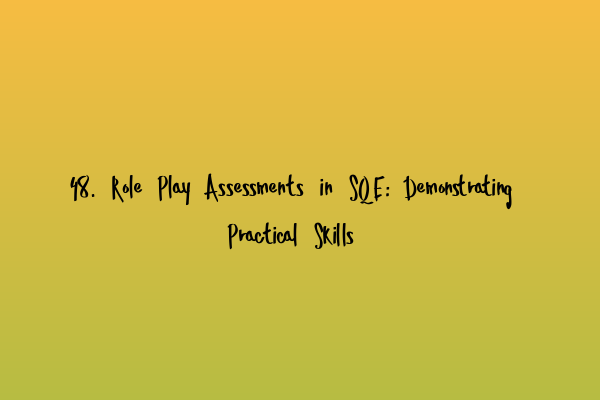48. Role Play Assessments in SQE: Demonstrating Practical Skills
Aspiring solicitors face a new and exciting challenge with the implementation of the Solicitors Qualifying Exam (SQE). This comprehensive assessment requires candidates to showcase their practical skills in a variety of areas, including role play assessments.
Role play assessments are a crucial component of the SQE, as they provide candidates with the opportunity to demonstrate their ability to handle realistic legal scenarios. These assessments simulate real-life legal interactions, requiring candidates to think on their feet, communicate effectively, and apply their legal knowledge to solving client problems.
To excel in role play assessments, it is essential to understand the format, expectations, and preparation strategies. In this blog post, we will explore the key aspects of role play assessments and provide you with valuable insights to help you succeed in this challenging component of the SQE.
The Format of Role Play Assessments
Role play assessments in the SQE typically consist of a series of scenarios in which candidates take on the role of a solicitor and interact with a simulated client or another legal professional. These scenarios can cover a diverse range of legal practice areas, such as criminal law, contract law, family law, or commercial law.
During the assessment, candidates are evaluated on their ability to:
- Build rapport with the client or legal professional
- Ask relevant questions to gather pertinent information
- Effectively communicate legal advice and information
- Resolve conflicts and negotiate outcomes
- Demonstrate professionalism and ethical behavior
The assessments are typically timed, creating a sense of realism and pressure similar to a real-life legal setting. This time constraint further emphasizes the need for candidates to think quickly and make sound decisions.
Preparing for Role Play Assessments
Proper preparation is crucial to perform well in role play assessments. Here are some key steps you can take to enhance your readiness:
- Understand the assessment criteria: Familiarize yourself with the assessment criteria and understand what the examiners are looking for. This will help you tailor your responses and actions accordingly.
- Practice realistic scenarios: Seek out practice resources, such as SQE 1 practice exam questions and SQE 1 mock exams, that provide realistic scenarios for role play assessments. Practice these scenarios with a partner to simulate real-life interactions and receive feedback on your performance.
- Develop strong communication skills: Effective communication is essential in role play assessments. Practice active listening, clear articulation, and concise explanations to ensure you convey your legal advice effectively.
- Build legal knowledge: Enhance your legal knowledge in the relevant practice areas to be better equipped in providing accurate and comprehensive advice during the assessments. Enrolling in SQE 1 preparation courses can significantly enhance your understanding of the core legal subjects.
By following these preparation strategies, you can build the necessary skills and confidence to excel in role play assessments and demonstrate your suitability for a career as a solicitor.
Maximizing Your Success in Role Play Assessments
While solid preparation lays the foundation for success in role play assessments, there are additional strategies you can employ during the assessment to maximize your performance:
- Stay calm and composed: Role play assessments can be intimidating, but it’s crucial to remain calm and composed throughout the process. Take a deep breath, listen attentively, and approach the scenario logically.
- Show empathy: Demonstrating empathy towards the client or legal professional in the scenario can help build rapport and trust. Show understanding and sensitivity to their concerns and needs.
- Ask clarifying questions: If you’re unsure about any details or aspects of the scenario, don’t hesitate to ask clarifying questions. This shows your commitment to understanding the situation fully.
- Use clear and concise language: Avoid legal jargon and aim to communicate your advice in clear and concise language. This ensures that your message is easily understood by the client or legal professional.
- Be adaptable: Role play assessments often involve unexpected twists or challenges. Be prepared to adapt your approach and think on your feet to find suitable solutions.
Remember, role play assessments are your opportunity to demonstrate your practical skills and ability to handle real-life legal scenarios. Embrace the challenge, stay focused, and showcase your capabilities.
To access additional resources and courses to support your SQE preparation, we recommend exploring the following articles:
- SQE 1 Practice Exam Questions
- SQE 1 Practice Mocks FLK1 FLK2
- SQE 2 Preparation Courses
- SQE 1 Preparation Courses
- SRA SQE Exam Dates
The journey towards becoming a solicitor through the SQE is challenging but immensely rewarding. With proper preparation, dedication, and the right mindset, you can conquer the role play assessments and take a step closer to achieving your legal career goals.
